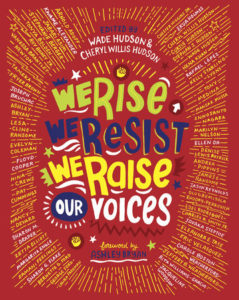The results of the November 2016 national election in the United States left millions of parents and children terrified about what would happen next. The triumph of a candidate and party that ran on an explicitly anti-immigrant, anti-Muslim, and racist campaign—one that pledged to strip the rights of LGBTQ+ and disabled persons as well—implied great danger for those targeted.
 A number of anthologies to offer comfort, hope, and inspiration for future social justice activism emerged from this election. Edited by Wade Hudson and Cheryl Willis Hudson, We Rise, We Resist, We Raise Our Voices, is a standout among these for a number of reasons. One is that the included writers and illustrators come from groups that have been targeted and groups that have faced past oppression. They are elders with words of wisdom drawn from personal experience: African-American veterans of the civil rights movement, children of immigrants, Native American writers and artists and others who broke into a previously closed publishing industry by founding small presses and self-publishing. Another difference is the sheer variety of creative work showcased in this anthology—poetry, short stories, autobiographical essays, letters to children and grandchildren, photographs, and illustrations in various styles and media. In addition, the book is directed to younger children, those in elementary school, with an approach that is both reassuring and empowering. The authors take on the role of trusted adult, letting young readers know that they are loved, that their ancestors have survived terrible times in the past and, working together, we will survive and overcome our current struggles as well.
A number of anthologies to offer comfort, hope, and inspiration for future social justice activism emerged from this election. Edited by Wade Hudson and Cheryl Willis Hudson, We Rise, We Resist, We Raise Our Voices, is a standout among these for a number of reasons. One is that the included writers and illustrators come from groups that have been targeted and groups that have faced past oppression. They are elders with words of wisdom drawn from personal experience: African-American veterans of the civil rights movement, children of immigrants, Native American writers and artists and others who broke into a previously closed publishing industry by founding small presses and self-publishing. Another difference is the sheer variety of creative work showcased in this anthology—poetry, short stories, autobiographical essays, letters to children and grandchildren, photographs, and illustrations in various styles and media. In addition, the book is directed to younger children, those in elementary school, with an approach that is both reassuring and empowering. The authors take on the role of trusted adult, letting young readers know that they are loved, that their ancestors have survived terrible times in the past and, working together, we will survive and overcome our current struggles as well.
Many of the authors write about growing up under Jim Crow and seeing the changes with the civil rights movement. Some counsel self-care and self-preservation because a family’s love is most important of all; for instance, Sharon M. Draper’s poem “Prayers of the Grandmother” contains the refrain, “Stay safe, my child, she’d whisper. / Come home to me each night.” Bernette G. Ford, Lesa Cline Ransome, and Sharon G. Flake name the civil rights heroes, known and unknown, who serve as models and inspiration for young people today. Eleanora E. Tate and Roy Boney, Jr. describe how they overcame prejudice and a canon of stereotypes to tell their authentic stories. A number of authors offer advice on confronting bullies and bigotry and channeling anger into more productive pursuits. Yet others stress our common humanity as a means of reaching out to others and knowing that each one of us is valued no matter what some leaders and their followers may say. No one underplays the challenges or difficulties of the current situation but all counsel belief in ourselves, working with others, and having the patience of one who, as Margarita Engle writes in “I Wonder,” “plant[s] / many seedlings anyway, so that by the time/I’m old, a whole forest will wave/happy branches.”
We Rise, We Resist, We Raise Our Voices is an essential title for elementary-age children as well as their teachers and caregivers.
Note: Several of the contributors to the anthology spoke on a panel titled “What Shall We Tell the Children?” at the PEN World Voices Festival in April 2018. You may read a report on the panel here.
2 comments for “Words for Our Time: A Review of We Rise, We Resist, We Raise Our Voices”